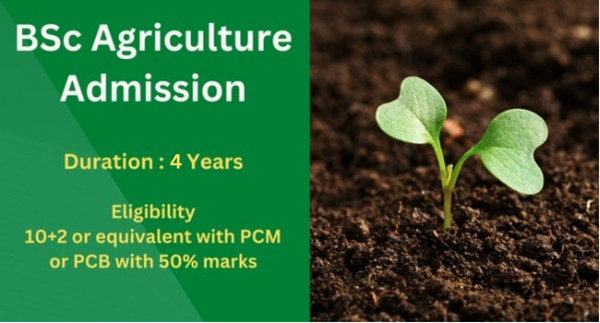BSc Agriculture is a 4-year degree focused on making students experts in agricultural sciences, covering domains like crop production, soil science, plant pathology, and agricultural engineering. This article overviews the BSc Agriculture fees structure in over 20 government and private colleges across various Indian states to help aspirants make informed admissions decisions.
BSc Agriculture Course Highlights
Full Form | Bachelor of Science in Agriculture |
Duration | 4 years (8 semesters) |
Eligibility | 10+2 in Science stream with Biology/ Maths/ Agriculture |
Course Overview | Covers agriculture sciences, crop production, soil science, plant pathology, agricultural economics etc. Includes practical lab sessions and industry visits. |
Career Prospects | Agriculture scientist, Agronomist, Horticulturist, Seed production specialist, Agriculture research scientist, Agriculture extension officer, Quality analyst etc. |
Job Types | Government sector (agricultural departments, research institutes), Private sector (food processing, dairy industries, seed production companies etc.) |
Further Studies | MSc Agriculture, MBA Agriculture, MSc Horticulture, PhD |
Fee Structure | Rs 15,000 to 1 Lakh in Government Colleges & Rs 20000 to 3 Lakh in Private Colleges |
BSc Agriculture Fees in Private Colleges
In private colleges, BSc Agriculture tuition fees generally range from ₹ 20,000 to ₹ three lakhs per annum. Many private colleges also offer management quota seats for direct BSc admission without an entrance test for deserving students.
Listed below are the approximate fee structure of some of the famous private agriculture colleges across India:
Colleges | Location | Fees |
BFIT Group of Institutes, Dehradun | Dehradun, Uttarakhand | Rs. 3.05 Lakhs |
Doon Business School, Dehradun | Dehradun, Uttarakhand | Rs. 5.23 Lakhs |
Gulzar Group of Institutes, Ludhiana | Ludhiana, Punjab | Rs. 2.13 Lakhs |
Isba Institute of Professional Studies, Indore | Indore, Madhya Pradesh | Rs. 61,200 |
Roorkee College of Engineering, Roorkee | Roorkee, Uttarakhand | Rs. 2.83 Lakhs |
Government Mohindra College, Patiala | Patiala, Punjab | Rs. 1.49 Lakhs |
Mahatma Gandhi College, Sehore | Sehore, Madhya Pradesh | Rs. 24,480 |
Post Graduate College, Ghazipur | Ghazipur, Uttar Pradesh | Rs. 16,177 |
College of Agriculture, Shimoga | Shimoga, Karnataka | Rs. 1.77 Lakhs |
BSc Agriculture Fees in Government Colleges
The annual tuition fees in government agriculture universities across India generally range from ₹15,000 to ₹1 Lakh, which is nominal, making them the most affordable options.
Listed below are the approximate fee particulars of some of the popular government agriculture colleges state-wise:
Colleges | Location | Fees |
College of Agriculture, Shimoga | Shimoga, Karnataka | Rs. 1.77 Lakhs |
College of Horticulture and Forestry, Pasighat | Pasighat, Arunachal Pradesh | Rs 1.90 Lakhs |
Government College, Hoshiarpur | Hoshiarpur, Punjab | Rs. 70,870 |
Government Mohindra College, Patiala | Patiala, Punjab | Rs. 1.49 Lakhs |
Mahatma Gandhi College, Sehore | Sehore, Madhya Pradesh | Rs. 24,480 |
Post Graduate College, Ghazipur | Ghazipur, Uttar Pradesh | Rs. 16,177 |
Government College, Hoshiarpur | Hoshiarpur, Punjab | Rs. 70,870 |
Government Mohindra College, Patiala | Patiala, Punjab | Rs. 1.49 Lakhs |
Admission Process
The admission process for a BSc agriculture degree varies by university but generally involves qualifying in 10+2 or equivalent in the science stream with subjects including physics, chemistry, biology/math. Students need to meet the minimum percentage requirement. Admission is based on performance in the national/state-level agricultural entrance exams and personal interviews to evaluate interests and aptitude. Seats are also allocated through the general merit category depending on 12th board exam scores. Applications are submitted online through university portals along with all academic records, entrance exam scores, and eligibility criteria. Respective agricultural colleges and universities provide detailed fee structure and program details. You may also check the details of BVSc Admission process in India.
Management Quota Admission
In management quota admission, specific seats are reserved in private agricultural colleges to admit students outside the general merit category. It provides an alternative route for gaining admission to a BSc in agriculture. Students who can pay higher fees can get direct admission. The eligibility criteria regarding educational qualifications remain equivalent to the open category. Applications need to be submitted to the institution along with supporting documents.
Why Study BSc Agriculture?
Pursuing a BSc in agriculture opens up excellent prospects for students interested in contributing to food security and helping farmers. With widespread rural unemployment, agribusiness offers diverse career paths to tap into agriculture’s enormous growth potential.
A BSc agriculture degree builds scientific knowledge spanning crops, soil science, horticulture, plant pathology, entomology, breeding, biotechnology, meteorology, and more.
Students gain technical skills and practical training for applying the latest innovations in sustainable farming, managing agri-input businesses, food processing, commodities trading, and other supporting services.
Job Prospects
There are diverse job prospects after completing a BSc in agriculture. Graduates can work in farm management, agricultural research, education, extension services, agribusiness, food processing industries, agricultural marketing, and rural banking.
Jobs exist in government and private sectors with central/state agriculture departments, agricultural universities, seed and fertilizer companies, food processing firms, rural banks, and more.
The sustained importance of agriculture and food production ensures continued demand. Graduates can also become scientists, professors, agricultural consultants, and specialists with additional qualifications.
FREQUENTLY ASKED QUESTIONS
Based on affordability, focus on specializations offered, placement records, and infrastructure before deciding.
Yes, based on 10+2 academics, income criteria, sports excellence, etc.
The BSc agriculture fees for Management quota seats will be higher. Management quota fees for BSc agriculture range from 2 to 6 Lakhs, depending on the colleges.
No, NEET is not required to get admission to BSc agriculture.
Conclusion
The BSc Agriculture course equips students with in-depth knowledge of agriculture and allied sciences practical skills. It prepares them for a rewarding agriculture and food production career. The course fees, curriculum, eligibility criteria, and career prospects make it a good choice for science stream students interested in agriculture.

